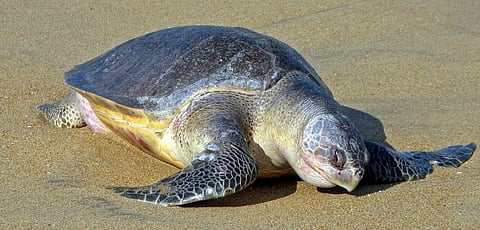

The annual spectacle of the mass nesting of millions of Olive Ridley sea turtles near the Rushikulya river mouth in Odisha is likely to be missed this year, as the time for it is almost over. The mass nesting this time was about a month late as compared to last year.
More than 323,000 Olive Ridley turtles had nested en masse in the stretch from Purunabandh to Bateswara, near the Rushikulya river mouth in Ganjam district from March 21-28, 2020, when there was a lockdown in place due to to novel coronavirus disease pandemic.
It’s been around one month since the mass nesting of last year. Moreover, the sand is hot due to the scorching sun. Even the turtles that had congregated in the sea about a fortnight ago, have almost disappeared, Amlan Nayak, divisional forest officer, Berhampur, said.
He said though mass nesting did not take place this year, sporadic nesting did happen across the 56-kilometre long beach in the district. As many as 4,106 turtles had laid eggs on the entire coast till April 21.
If they do skip the beach, this won’t be the first time. In 2002, 2007, 2016 and 2019, the turtles had not shown up at Rushikulya. This is why forest officials say they can’t predict nesting patterns, Nayak said.
The Rushikulya river mouth is considered the second-biggest rookery in India after Gahirmatha. Mass nesting in the Gahirmatha marine sanctuary occurred from March 9-23, 2021 and over 349,000 eggs were laid during this period.
Wildlife experts and activists have given mixed reactions over the skipping of the mass nesting this time.
“It is a natural phenomenon. During some years, they did not turn up for mass nesting even though a huge number had congregated in the sea,” Muralidharan M, field director, Dakshin Foundation, a non-profit that monitors the nesting of Olive Ridley turtles at the Rushikulya mouth for the last several years, said.
Sudhakar Mohapatra, a retired senior forest officer said the southern wind, which helped the turtles climb the beach, was almost missing this year. Besides the cloudy weather in the afternoon, this time was not conducive for mass nesting, he stated. “Wildlife scientists and turtles experts are needed to do a thorough study to find out the reason for their staying away from the Odisha coast this year,” he said.
Rabindra Sahu, secretary of the Rushikulya Sea Turtle Protection Committee, said beach erosion might be one of the causes for the turtles staying away this year. “Sea erosion usually takes place during the rainy season. This year, the beach eroded a portion near the rookery,” he said.